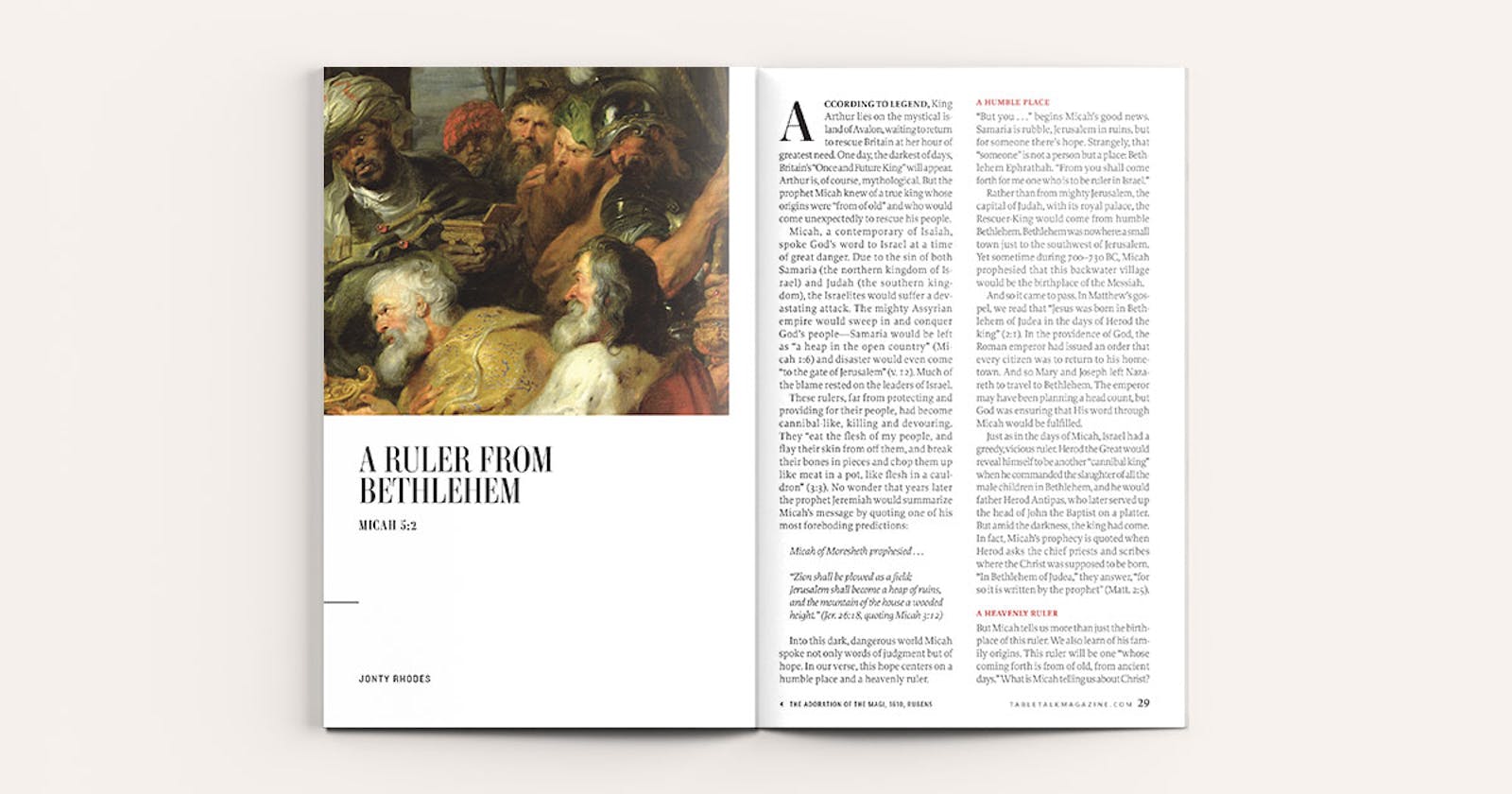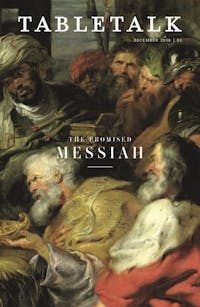
Request your free, three-month trial to Tabletalk magazine. You’ll receive the print issue monthly and gain immediate digital access to decades of archives. This trial is risk-free. No credit card required.
Try Tabletalk NowAlready receive Tabletalk magazine every month?
Verify your email address to gain unlimited access.
According to legend, King Arthur lies on the mystical island of Avalon, waiting to return to rescue Britain at her hour of greatest need. One day, the darkest of days, Britain’s “Once and Future King” will appear. Arthur is, of course, mythological. But the prophet Micah knew of a true king whose origins were “from of old” and who would come unexpectedly to rescue his people.
Micah, a contemporary of Isaiah, spoke God’s word to Israel at a time of great danger. Due to the sin of both Samaria (the northern kingdom of Israel) and Judah (the southern kingdom), the Israelites would suffer a devastating attack. The mighty Assyrian empire would sweep in and conquer God’s people—Samaria would be left as “a heap in the open country” (Micah 1:6) and disaster would even come “to the gate of Jerusalem” (v. 12). Much of the blame rested on the leaders of Israel.
These rulers, far from protecting and providing for their people, had become cannibal-like, killing and devouring. They “eat the flesh of my people, and flay their skin from off them, and break their bones in pieces and chop them up like meat in a pot, like flesh in a cauldron” (3:3). No wonder that years later the prophet Jeremiah would summarize Micah’s message by quoting one of his most foreboding predictions:
Micah of Moresheth prophesied . . .
“Zion shall be plowed as a field; Jerusalem shall become a heap of ruins, and the mountain of the house a wooded height.” (Jer. 26:18, quoting Micah 3:12)
Into this dark, dangerous world Micah spoke not only words of judgment but of hope. In our verse, this hope centers on a humble place and a heavenly ruler.
A Humble Place
“But you . . .” begins Micah’s good news. Samaria is rubble, Jerusalem in ruins, but for someone there’s hope. Strangely, that “someone” is not a person but a place: Bethlehem Ephrathah. “From you shall come forth for me one who is to be ruler in Israel.”
Rather than from mighty Jerusalem, the capital of Judah, with its royal palace, the Rescuer-King would come from humble Bethlehem. Bethlehem was nowhere: a small town just to the southwest of Jerusalem. Yet sometime during 700–730 BC, Micah prophesied that this backwater village would be the birthplace of the Messiah.
And so it came to pass. In Matthew’s gospel, we read that “Jesus was born in Bethlehem of Judea in the days of Herod the king” (2:1). In the providence of God, the Roman emperor had issued an order that every citizen was to return to his hometown. And so Mary and Joseph left Nazareth to travel to Bethlehem. The emperor may have been planning a head count, but God was ensuring that His word through Micah would be fulfilled.
Just as in the days of Micah, Israel had a greedy, vicious ruler. Herod the Great would reveal himself to be another “cannibal king” when he commanded the slaughter of all the male children in Bethlehem, and he would father Herod Antipas, who later served up the head of John the Baptist on a platter. But amid the darkness, the king had come. In fact, Micah’s prophecy is quoted when Herod asks the chief priests and scribes where the Christ was supposed to be born. “In Bethlehem of Judea,” they answer, “for so it is written by the prophet” (Matt. 2:5).

A Heavenly Ruler
But Micah tells us more than just the birthplace of this ruler. We also learn of his family origins. This ruler will be one “whose coming forth is from of old, from ancient days.” What is Micah telling us about Christ?
Given that the prophecy is addressed to Bethlehem, it’s likely in the first place that this is an allusion to that town’s most famous son. King David, the founding father of Israel’s kingly line, was born in Bethlehem, many years before Micah’s prophecy. The future ruler would be from this root: Jesus is a descendant of David, the king from of old. He has ancient, royal blood.
But I think Micah is telling us more. Christ’s origins are far older than David, Abraham, or even creation itself. Psalm 74:12 tells us that “God my king is from of old,” using the same expression that Micah uses to describe Christ. Micah is hinting that Jesus’ origins are not just Davidic but divine. He is God the Son, and as God, He has no beginning. He has always existed.
So, far from the corridors of power, Jesus Christ, descended from David through His adoptive father, Joseph, was born in Bethlehem. God Himself came to rule and rescue. He looked unimpressive. His birthplace was inauspicious. But this is always God’s way: through the weak and foolish message of the cross comes rescue from sin—a far greater threat than Micah’s Assyrians. And how fitting that Bethlehem means “house of bread.” An appropriate birthplace for the One who, in stark contrast to Herod and the cannibal kings of Micah’s day, came to feed His people. The Bread of Life, lying in a manger, a feeding trough, in the House of Bread.
